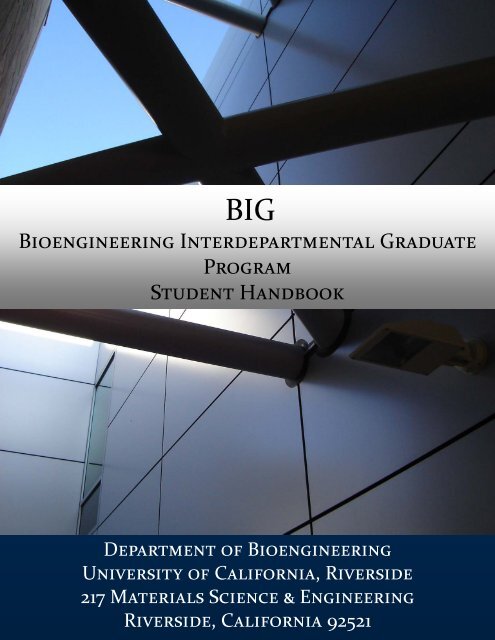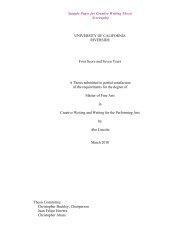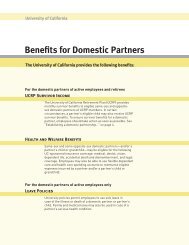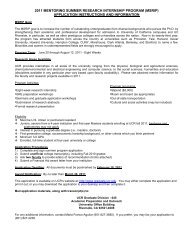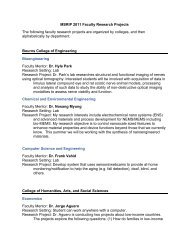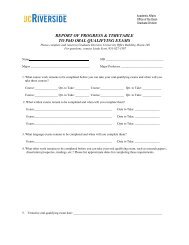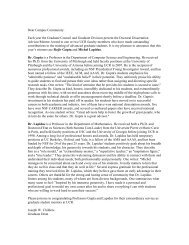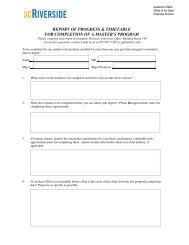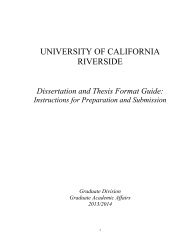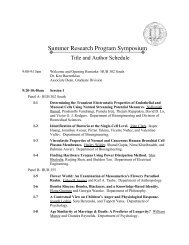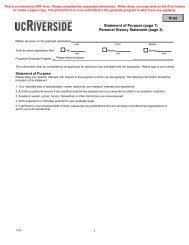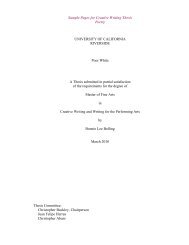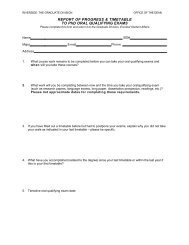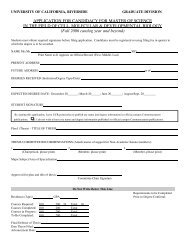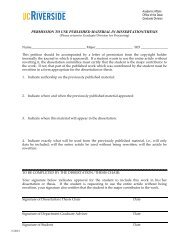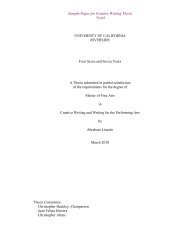2 I - Graduate Division - University of California, Riverside
2 I - Graduate Division - University of California, Riverside
2 I - Graduate Division - University of California, Riverside
Create successful ePaper yourself
Turn your PDF publications into a flip-book with our unique Google optimized e-Paper software.
BIG<br />
B I G<br />
P<br />
S H<br />
D B<br />
U C, R<br />
217 M S E<br />
R, C 92521
S H 12/13<br />
T C<br />
Introduction 2<br />
Overview 3<br />
Information 4<br />
Employment<br />
UCR Card<br />
Mail<br />
Copy Codes and Usage<br />
SPEAK Test Requirement<br />
Areas <strong>of</strong> Study 5<br />
BIEN Core Courses<br />
Academic Standards <strong>of</strong> Scholarship 6<br />
Master <strong>of</strong> Science (M.S.) Degree Program 7<br />
Plan I<br />
Plan II<br />
Thesis Committee<br />
Advancement to Candidacy and Degree Conferral<br />
Doctor <strong>of</strong> Philosophy (Ph.D.) Degree Program 9<br />
Course Work<br />
The Examination Committee<br />
Written Qualifying Examination<br />
Teaching Requirement<br />
The Ph.D. Qualifying Committee<br />
Oral Qualifying Examination<br />
Dissertation Proposal<br />
Advancement to Candidacy<br />
Dissertation and Final Oral Examination<br />
Degree Conferral<br />
Annual Research Progress Evaluation (ARPE) 15<br />
Financial Assistance 17<br />
Useful Websites 19<br />
Important Contacts 20<br />
1
STUDENT HANDBOOK 12/13<br />
I<br />
Welcome to the Department <strong>of</strong> Bioengineering and the BIG (Bioengineering Interdepartmental <strong>Graduate</strong>)<br />
Program!<br />
The Department <strong>of</strong> Bioengineering, established in 2006, is the fasting growing department at the Bourns<br />
College <strong>of</strong> Engineering and is chaired by Pr<strong>of</strong>essor Victor G.J. Rodgers The research vision is to build strength<br />
from experts in biochemistry, biophysics, biology, and engineering to focus on critical themes that impact<br />
bioengineering.<br />
The mission <strong>of</strong> the new Department <strong>of</strong> Bioengineering at the <strong>University</strong> <strong>of</strong> <strong>California</strong>, <strong>Riverside</strong> focuses on<br />
two interrelated themes:<br />
1. Advancing Bioengineering research, and,<br />
2. Preparing future leadership in Bioengineering and related fields.<br />
Our unique interdisciplinary program combines building a solid fundamental foundation in biological science<br />
and engineering, developing diverse communication skills and providing training in the most advanced<br />
quantitative bioengineering research. The result is a rigorous, but exceptionally interactive and welcoming<br />
educational training for Bioengineering students leading towards B.S., M.S. and Ph.D. degrees.<br />
BIG is the umbrella for graduate level research effort associated with the faculty in the Department <strong>of</strong><br />
Bioengineering as well as other Participating Faculty at UCR who have a passion for training graduate<br />
students in bioengineering. BIG <strong>of</strong>fers a rigorous but exceptionally interactive and welcoming educational<br />
environment. BIG , <strong>of</strong>fers graduate study leading to the M.S. and Ph.D. degrees.<br />
2
STUDENT HANDBOOK 12/13<br />
O<br />
This handbook provides much <strong>of</strong> the information you will need as you make progression towards completion<br />
<strong>of</strong> your graduate degree. This document should be used as a supplement to the <strong>of</strong>ficial graduate student<br />
handbook that can be found on the UCR <strong>Graduate</strong> <strong>Division</strong> website at http://graduate.ucr.edu/GSHndbk.pdf.<br />
Of course, we are here to help you so if you have any questions please contact us.<br />
Welcome again to UCR and we look forward to working with you during your graduate career!<br />
3
STUDENT HANDBOOK 12/13<br />
I<br />
Employment<br />
If you are going to be employed as a <strong>Graduate</strong> Student Researcher or TA (teaching assistant) you will need to<br />
complete hiring paperwork with Jennifer Morgan. You will receive a timesheet monthly to be signed by you<br />
and your advisor. When meeting with Jennifer you will need to remember to bring your Driver’s License and<br />
Social Security card. International students should also bring their passport and visa paperwork.<br />
UCR Card<br />
Upon your arrival you should obtain an UCR Card (photo identification card). The card allows you to check<br />
books out <strong>of</strong> the library and is used for card access for most <strong>of</strong> the doors in Bourns Hall. UCR cards can be<br />
obtained from the UCR Card <strong>of</strong>fice, located in the Highlander Union Building (HUB) Suite 249, between the<br />
hours <strong>of</strong> 9:00am and 4:00pm, Monday through Friday. The cost <strong>of</strong> the UCR Card is currently $25.<br />
Card key (UCR Card) access to general student areas is granted when the students first apply for a computer<br />
and e‐mail account during the graduate student orientation. This access will be continuous as long as a<br />
student is in good academic standing. Access to research laboratories must be requested by the faculty<br />
member supervising the specific research laboratory. However all students must contact Ms. Hong Xu, Development<br />
Engineer and Safety Officer, A217 Bourns Hall, prior to attaining research laboratory access. Ms. Xu<br />
will provide the appropriate instruction to attain laboratory safety training. Access to instructional laboratories<br />
is granted to TAs on a quarterly basis by the Department Chair. TAs must also contact Ms. Hong Xu to<br />
receive instruction on the appropriate laboratory safety training.<br />
Mail<br />
Incoming mail and intercampus notices may be picked up from mailboxes in the mailroom, A220 Bourns Hall.<br />
Mail is distributed daily at approximately 9:00am and 2:00pm. Outgoing intercampus mail and <strong>of</strong>ficial<br />
university mail can be deposited in the brown bag located in the department suite, A220 Bourns Hall.<br />
Students should send and receive all personal mail at their personal residence.<br />
Copy Codes and Usage<br />
There is a department copier in the mailroom in A220 Bourns Hall that is available. The request for a copy<br />
access code must first be approved by the student’s advisor or TA faculty supervisor.<br />
The copier may be used only by graduate students copying material associated with their duties as a teaching<br />
or research assistant. Personal copying, including copying <strong>of</strong> notes, homework or exam solutions and journal<br />
articles not associated with research or teaching assistant duties, as well as thesis drafts, is not permitted on<br />
departmental copiers. Public copy machines are located in the UCR Bookstore, Rivera Library, and the<br />
Science Library.<br />
SPEAK Test requirement<br />
To meet the degree requirements <strong>of</strong> the Bioengineering program, all BIG students whose native language is<br />
not English must achieve a “Clear Pass” on the SPEAK test before the completion <strong>of</strong> their first year or they will<br />
be asked to leave the program. However, for those who receive a “conditional pass,” a departmental<br />
committee will evaluate their English Pr<strong>of</strong>iciency before a final decision is made.<br />
4
STUDENT HANDBOOK 12/13<br />
A S<br />
BIG students have the flexibility to study a wide range <strong>of</strong> courses that can be targeted to the individual<br />
student's pr<strong>of</strong>essional goals. However, so that all BIG students have a fundamental foundation in<br />
bioengineering, they must take key courses that will satisfy this core requirement. The elective list is<br />
substantial and also includes medical school courses <strong>of</strong>fered in the UCR/UCLA Thomas Haider Program in<br />
Biomedical Sciences <strong>Graduate</strong> Program.<br />
BIG Core Courses<br />
All BIG students are required to take at least three courses from the following Bioengineering courses. Other<br />
courses may be substituted but must be approved by the Bioengineering <strong>Graduate</strong> Advisor. Students from<br />
non‐engineering backgrounds are required to take BIEN 268. M.S. and Ph.D. students alike are expected to<br />
complete the course requirements for the programs within their first year <strong>of</strong> residence. Please note that<br />
students from non‐engineering backgrounds will be required to take BIEN 264‐Biotransport Phenomena.<br />
1. BIEN 223 ‐ Engineering Analysis <strong>of</strong> Physiological Systems<br />
2. BIEN 224 ‐ Cellular and Molecular Engineering<br />
3. BIEN 245– Optical Methods in Biology, Chemistry, and Engineering<br />
4. BIEN 249 ‐ Integration <strong>of</strong> Computational and Experimental Biology<br />
5. BIEN 264 ‐ Biotransport Phenomena<br />
6. BIEN 268 ‐ Bioengineering Experimentation and Analysis<br />
Other Requirements<br />
Other required courses: One bioscience class chosen from:<br />
<br />
<br />
<br />
<br />
<br />
<br />
<br />
<br />
BCH 210 ‐ Biochemistry <strong>of</strong> Macromolecules<br />
BCH 211 ‐ Molecular Biology<br />
BCH 212 ‐ Signal Transduction and Biochemical Regulation<br />
BIOL/CMDB 200 ‐ Cell Biology<br />
BIOL/CMDB 201 ‐ Molecular Biology<br />
BIOL 203 ‐ Cellular Biophysics<br />
BIOL 221 ‐ Microbial Genetics<br />
Equivalent Selections from Biomedical Sciences Medical School Courses<br />
In addition, BIEN 286‐Colloquium in Bioengineering, is required every quarter in which it is <strong>of</strong>fered.<br />
5
STUDENT HANDBOOK 12/13<br />
A S S<br />
Every student was chosen for graduate study in BIEN after an extensive selection process. You were chosen<br />
because the faculty believes you have the motivational and intellectual qualities needed to perform well in our<br />
program. We fully expect every student to perform well and to be successful in their graduate career.<br />
The following is an excerpt from the <strong>University</strong> <strong>of</strong> <strong>California</strong>, <strong>Riverside</strong> <strong>Graduate</strong> Council Policy on Academic<br />
Standards. You can view the full policy on the Office <strong>of</strong> <strong>Graduate</strong> Studies website.<br />
Only courses in which grades <strong>of</strong> "A," "B," "C," or "S" are received are counted toward satisfying graduate<br />
degree requirements. To continue in good standing and obtain an advanced degree, students must maintain a<br />
minimum grade point average (GPA) <strong>of</strong> 3.00. In addition, all students must demonstrate acceptable progress<br />
toward their degree objectives. This entails the satisfactory completion <strong>of</strong> all course work and other degree<br />
requirements in a timely fashion.<br />
Students are considered to be making unacceptable progress and become subject to dismissal when:<br />
they have 12 or more units <strong>of</strong> "I" grades outstanding;<br />
the overall GPA falls below 3:00;<br />
the quarterly GPA falls below 3.00 for two consecutive quarters;<br />
they fail to take their oral qualifying exams within five years;<br />
they fail to fulfill program requirements such as exams or research in a timely and satisfactory<br />
manner;<br />
they have not completed their programs within one year after reaching the normative time;<br />
they fail to pass comprehensive or qualifying examinations in two attempts.<br />
Please contact the <strong>Graduate</strong> Student Affairs Assistant if you have any questions on the Standards <strong>of</strong><br />
Scholarship policies.<br />
6
STUDENT HANDBOOK 12/13<br />
M S (M.S.) D P<br />
The M.S. program is part <strong>of</strong> BIG (Bioengineering Interdepartmental <strong>Graduate</strong>) Program. The M.S. program is<br />
ideal for pr<strong>of</strong>essionals seeking greater depth in several areas <strong>of</strong> bioengineering or individuals with biological<br />
science degrees who wish to enhance their foundation for employment in the many biotechnology fields.<br />
The Master <strong>of</strong> Science degree requires a minimum <strong>of</strong> 36 quarter credits and may be completed in three to four<br />
academic quarters <strong>of</strong> full‐time study. Both thesis and non‐thesis options are <strong>of</strong>fered for the M.S. degree<br />
program (Plan I, Thesis and Plan II, Comprehensive Examination). Students must request permission to<br />
pursue a Master <strong>of</strong> Science in Bioengineering while simultaneously pursing a Ph.D. in a program other than<br />
Bioengineering.<br />
The normative time to complete the M.S. degree is two years.<br />
Plan I (Thesis)<br />
In addition to the following Bioengineering requirements, all applicants must meet the requirements for Plan<br />
I (Thesis) <strong>of</strong> the UCR <strong>Graduate</strong> Council course Requirements. Bioengineering students must satisfy the core<br />
course requirements (see Core Courses). Students are also required to enroll in BIEN 286, Colloquium in<br />
Bioengineering, each quarter it is <strong>of</strong>fered.<br />
Plan II (Comprehensive Examination)<br />
This Plan is designed primarily for students who do not intend to pursue a Ph.D. in Bioengineering. In<br />
addition to the following requirements, all applicants must meet the requirements for Master’s Degree Plan II<br />
(Comprehensive Examination).<br />
Annual Research Progress Evaluation (ARPE)<br />
Each BIG student is required, by both the <strong>Graduate</strong> <strong>Division</strong> and the BIG Program, to have an Annual<br />
Research Progress Evaluation (ARPE). This consists <strong>of</strong> an annual meeting with the student’s appropriate<br />
advisory committee where the student presents an oral and written summary <strong>of</strong> their research progress in the<br />
past year. The details <strong>of</strong> the ARPE are found beginning on Page 15.<br />
Comprehensive Exam<br />
The comprehensive examination will be prepared and administered by the <strong>Graduate</strong> Examination Committee.<br />
The student will be allowed to choose between an oral and a written examination. The examination will cover<br />
a broad range <strong>of</strong> topics chosen from upper division undergraduate courses and graduate courses taken by<br />
M.S. students. Subsequent to the examination, the <strong>Graduate</strong> Examination Committee will issue a passing or<br />
failing grade. If a student fails in the first attempt, he or she may retake the examination at the next scheduled<br />
comprehensive examination period. No more than two attempts to pass the exam are allowed. The M.S.<br />
Comprehensive Examination may be held at the end <strong>of</strong> any quarters throughout the year. The committee to<br />
administer the M.S. Comprehensive Examination will be selected by the <strong>Graduate</strong> Advisor and approved by<br />
the <strong>Graduate</strong> Program Committee. The exam will be held during finals week in the Spring.<br />
7
STUDENT HANDBOOK 12/13<br />
Advancement to Candidacy and Degree Conferral<br />
Students must be advanced to candidacy for the degree no later than the first week <strong>of</strong> the quarter in which<br />
their degree is expected to be awarded. Deadlines for submission are published each quarter in the Schedule<br />
<strong>of</strong> Classes and in the annual <strong>Graduate</strong> <strong>Division</strong> Calendar. If the application is not received by the deadline<br />
date, the degree may be deferred until the following quarter. If the Master's degree requires a thesis (Plan I),<br />
a thesis committee should be nominated. When the student is formally advanced to candidacy and the thesis<br />
committee appointed (if applicable), the student and the academic units are notified.<br />
The <strong>Graduate</strong> <strong>Division</strong> certifies the candidacy <strong>of</strong> the student and checks for the completion <strong>of</strong> the <strong>University</strong><br />
and departmental requirements. The student is sent a "Certificate <strong>of</strong> Candidacy" when certified. All<br />
requirements for the degree must be satisfied within a calendar year from the time <strong>of</strong> completion <strong>of</strong> the<br />
required course work. Should the student be unable to complete the degree requirements within this time,<br />
candidacy will lapse. The student must then file a General <strong>Graduate</strong> Student Petition requesting a<br />
reinstatement <strong>of</strong> Master's Candidacy with the <strong>Graduate</strong> <strong>Division</strong>.<br />
The Master's degree is conferred at the end <strong>of</strong> the academic quarter in which all requirements have been<br />
satisfied (the <strong>of</strong>ficial conferral day is the last day <strong>of</strong> the quarter). The student must have been formally<br />
advanced to candidacy during the quarter in which they finish their degree. Ordinarily, a graduate student<br />
will be registered or on Filing Fee status the quarter in which all degree requirements are completed and the<br />
degree is to be conferred. However, students may complete the requirements during the quarter break. If<br />
they were enrolled or on Filing Fee status the quarter before, they may complete degree requirements before<br />
the next quarter <strong>of</strong>ficially begins and not be assessed registration fees for that quarter.<br />
If a student wishes to complete degree requirements during the summer months, they must have had student<br />
status (be enrolled or on Filing Fee status) every quarter <strong>of</strong> the previous academic year to complete without<br />
paying additional fees. If they were withdrawn or on leave any one <strong>of</strong> those quarters, they must use Filing Fee<br />
status or enroll in two units <strong>of</strong> Summer Session course work to complete during the summer.<br />
If a student does not complete the necessary courses by the end <strong>of</strong> the quarter in which degree conferral is<br />
expected, or does not attain the required level <strong>of</strong> scholarship, registration for the next regular academic<br />
session is mandatory ‐ otherwise student status will lapse and candidacy for the degree may lapse. Once<br />
student status lapses, the degree can be conferred only after readmission <strong>of</strong> the student, followed by at least<br />
one quarter <strong>of</strong> registration or Filing Fee status.<br />
Students are advised by mail <strong>of</strong> formal degree award at the end <strong>of</strong> the quarter in which the degree is<br />
conferred. As soon as all degree requirements are completed, the student may request a formal letter <strong>of</strong><br />
certification <strong>of</strong> completion bearing the <strong>Graduate</strong> Dean's signature and <strong>University</strong> Seal from the <strong>Graduate</strong><br />
<strong>Division</strong>. A formal certification <strong>of</strong> completion is the equivalent <strong>of</strong> the diploma or the <strong>of</strong>ficial academic<br />
transcript posting for employment and career advancement purposes.<br />
Once the diploma is ready, the Registrar will notify students by postcard that they may pick‐up their diploma<br />
at that <strong>of</strong>fice. If they want it mailed to them they must pay the Registrar for postage. They should make these<br />
arrangements with the Registrar's Office. A graduate student pursuing the Master's degree as a terminal<br />
degree may not continue to register as a graduate student once the degree has been awarded unless they have<br />
been formally admitted to another program.<br />
8
STUDENT HANDBOOK 12/13<br />
D P (P.D.) D P<br />
The Ph.D. program is part <strong>of</strong> the BIG (Bioengineering Interdepartmental <strong>Graduate</strong>) Program. The Ph.D.<br />
program is heavily integrated with research activities and is intended for well‐qualified individuals who wish<br />
to pursue leadership careers in academic or industrial research.<br />
The Ph.D. program requires approximately three years <strong>of</strong> full‐time study beyond the master’s degree but an<br />
M.S. is not required to enter into the Ph.D. program. In consultation with a faculty advisor, BIG Ph.D.<br />
students plan their program <strong>of</strong> study. The doctoral dissertation is based on original research in the field <strong>of</strong><br />
specialization. The doctoral program includes a teaching requirement, an oral and written qualifying<br />
examination, and a dissertation.<br />
The normative time to complete the Ph.D. degree is five years.<br />
Course Work<br />
Upon choosing a faculty advisor, each Ph.D. student is appointed a Ph.D. advisory committee consisting <strong>of</strong><br />
two BIEN faculty members and the faculty advisor. This advisory committee is responsible for guiding the<br />
students in formulating their research activities and preparing for the preliminary and qualifying exams.<br />
The program <strong>of</strong> course work is formulated by each student and a faculty advisor in the first or second quarter<br />
after admission to the program and must be approved by the student's advisor and advisory committee. Every<br />
student must complete a program <strong>of</strong> study that includes:<br />
1. A major area <strong>of</strong> study intended to increase the student's depth <strong>of</strong> knowledge in an engineering research<br />
specialty and<br />
2. A minor area <strong>of</strong> study intended to support and increase the student's breadth <strong>of</strong> knowledge in the major<br />
area<br />
Students must satisfy the core course requirements (see BIG Core Courses, Page 5). Students must also enroll<br />
in the BIG colloquium series, BIEN 286, each quarter it is <strong>of</strong>fered.<br />
Annual Research Progress Evaluation (ARPE)<br />
Each BIG student is required, by both the <strong>Graduate</strong> <strong>Division</strong> and the Bioengineering Program, to have an<br />
Annual Research Progress Evaluation (ARPE). This consists <strong>of</strong> an annual meeting with the student’s<br />
appropriate advisory committee where the student presents an oral and written summary <strong>of</strong> their research<br />
progress in the past year. The details <strong>of</strong> the ARPE are found beginning on Page 15.<br />
The Examination Committee<br />
The BIEN Ph.D. examination committee consists <strong>of</strong> faculty members selected by the BIEN <strong>Graduate</strong> Studies<br />
Committee. These faculty members prepare exam questions and evaluate the student’s responses. The Ph.D.<br />
preliminary examination is designed to determine the student’s familiarity with basic scientific and<br />
engineering principles, and their application to their research interest.<br />
9
STUDENT HANDBOOK 12/13<br />
Written Qualifying Examination<br />
Students in the Ph.D. program must pass a written qualifying examination prior to taking the oral qualifying<br />
exam. The written qualifier will be prepared and graded by participating faculty and will be based on the six<br />
Bioengineering Core Courses (see Page 5). Students must pass three subject exams to successfully complete<br />
the written qualifier. Students may have two attempts in passing. If the student does not pass one or more<br />
exams in the written qualifier, they may choose to repeat the tested subject exam again or test for other exam<br />
related to the Bioengineering Core Courses. Normally the exam will be taken prior to completion <strong>of</strong> four<br />
academic quarters in residence. The written qualifying exam is <strong>of</strong>fered once a year after the spring quarter.<br />
Teaching Requirement<br />
All Ph.D. students must be employed as teaching assistants for at least two quarters. All TAs must take<br />
BIEN 302 (Teaching Practicum) to help them learn effective teaching methods such as handling discussion<br />
sections; preparing and handling laboratory sections; preparing and grading homework, examinations, and<br />
lab reports; and student relations.<br />
The Ph.D. Qualifying Committee<br />
Following successful passage <strong>of</strong> the Ph.D. Written Examination, a Ph.D. Qualifying Committee will be formed<br />
to evaluate a student's readiness for advancement to candidacy. The Ph.D. Qualifying Committee will be<br />
responsible for reviewing the student's Ph.D. dissertation proposal and administering an oral exam which may<br />
take the form <strong>of</strong> a defense <strong>of</strong> the proposal. Based on the oral defense, the Ph.D. Qualifying Committee will<br />
consult with the <strong>Graduate</strong> Advisor who will make a recommendation on behalf <strong>of</strong> the Qualifying Committee<br />
to the <strong>Graduate</strong> <strong>Division</strong> regarding advancement to candidacy.<br />
A Ph.D. Qualifying Committee consists <strong>of</strong> the student's faculty advisor and four (4) additional members who<br />
are nominated by the <strong>Graduate</strong> Advisor and approved by the <strong>Graduate</strong> Program Committee. The Chair <strong>of</strong> the<br />
Qualifying Committee is normally the student's Ph.D. advisor, who must be a voting member <strong>of</strong> the Academic<br />
Senate. At least, two (2) members <strong>of</strong> the Ph.D. Qualifying Committee are members <strong>of</strong> the BIG<br />
(Bioengineering Interdepartmental <strong>Graduate</strong>) Faculty. One member <strong>of</strong> the Qualifying Committee, designated<br />
the "outside member", should be from outside the BIG Program, but should be a voting member <strong>of</strong> the UC<br />
Academic Senate. Exceptions must be qualified for a UC faculty appointment, and must be supported by a<br />
memo <strong>of</strong> justification from the <strong>Graduate</strong> Advisor and approved as an exception by the <strong>Graduate</strong> Dean. After<br />
review <strong>of</strong> the nominations, the <strong>Graduate</strong> Dean appoints the Ph.D. Qualifying Committee on behalf <strong>of</strong> the<br />
<strong>Graduate</strong> Council. A memo need not be written for those holding Adjunct faculty positions.<br />
The Committee is nominated by the student and their advisor with the concurrence <strong>of</strong> the Department<br />
chairperson or <strong>Graduate</strong> Adviser. After review <strong>of</strong> the nominations, the Committee is appointed by the Dean<br />
<strong>of</strong> the <strong>Graduate</strong> <strong>Division</strong> on behalf <strong>of</strong> the <strong>Graduate</strong> Council. This Committee, once approved by the <strong>Graduate</strong><br />
Dean, becomes responsible for the student's academic guidance and evaluation until advanced to candidacy.<br />
10
STUDENT HANDBOOK 12/13<br />
The Ph.D. Qualifying Committee (cont.)<br />
The proposed Qualifying Committee and the date set for the exam must be submitted to the <strong>Graduate</strong><br />
<strong>Division</strong> Office on the Ph.D. Form 2 (Nomination for Qualifying Examination for the Degree <strong>of</strong> Doctor <strong>of</strong><br />
Philosophy) at least two weeks (preferably one month) prior to the date <strong>of</strong> the final qualifying examination<br />
date. If any nominee is not a member <strong>of</strong> the <strong>University</strong> <strong>of</strong> <strong>California</strong> Academic Senate, a curriculum vitae and<br />
a memo justifying the appointment from the <strong>Graduate</strong> Advisor or Department Chair should be submitted<br />
with the Form 2.<br />
Once the committee has been formally appointed, the date and time <strong>of</strong> the oral proposal presentation/<br />
defense will be scheduled. Any changes in the exam date or in the composition <strong>of</strong> the Committee must be<br />
communicated in writing to the <strong>Graduate</strong> <strong>Division</strong> not less than twenty‐four (24) hours before the oral<br />
examination is held.<br />
The qualifying oral dissertation proposal/defense is not open to the general public but members <strong>of</strong> the<br />
Academic Senate may attend. The recommendation <strong>of</strong> the committee must be reported to the <strong>Graduate</strong><br />
Council within forty‐eight (48) hours on Ph.D. Form 3 (Report on Qualifying Examination and Nomination <strong>of</strong><br />
Dissertation Committee) which is provided by the <strong>Graduate</strong> <strong>Division</strong> to departments on request. Each<br />
committee member must sign the form. No one can sign for them.<br />
A unanimous committee report for or against approval will be accepted for the <strong>Graduate</strong> Council by the Dean<br />
<strong>of</strong> the <strong>Graduate</strong> <strong>Division</strong>. If a student has failed the qualifying examination, the committee is required to<br />
make a recommendation for or against a second examination, ordinarily not to be given until at least three<br />
months have elapsed. The date <strong>of</strong> the second oral examination shall be communicated to the <strong>Graduate</strong><br />
<strong>Division</strong> in writing at least two weeks prior to its occurrence. A third examination is not permitted. The<br />
student will be notified <strong>of</strong> the results immediately following the exam when a unanimous vote is reached.<br />
If there is an initial divided vote, the committee will make every effort to arrive at unanimity. Failing<br />
unanimity, a committee report which contains only one negative vote will be deemed a pass, and a committee<br />
report which contains two (or more) negative votes will be considered a failure. When the vote is split, the<br />
committee or any member <strong>of</strong> the committee can petition (in writing) the <strong>Graduate</strong> Council to consider a<br />
reversal <strong>of</strong> the judgment. In that event, the Administrative Committee <strong>of</strong> the <strong>Graduate</strong> Council will make the<br />
final determination as to whether the student has passed. In such cases no statement is made to the student<br />
regarding his/her passing or failure until the final determination has been made. The student shall be<br />
informed within forty‐eight (48) hours that the vote is split and the final determination will be made by the<br />
<strong>Graduate</strong> Council.<br />
When the Committee meets to conduct the oral Qualifying Examination, it must report the vote and/or<br />
action to the <strong>Graduate</strong> Council via the <strong>Graduate</strong> Dean. If the Committee decides to reexamine the student at a<br />
later date or does not pass the student for any reason, this must be reported. Once a committee convenes an<br />
examination, either a pass or fail must be reported by that committee. The Form 3 must be signed by all<br />
committee members at the time the qualifying examination is concluded, and submitted even if the<br />
examination was failed.<br />
11
STUDENT HANDBOOK 12/13<br />
Oral Qualifying Examination<br />
Following successful completion <strong>of</strong> the written examination, candidates for the doctoral degree must pass an<br />
oral examination, normally within three quarters <strong>of</strong> the date <strong>of</strong> their written exam but within their first two<br />
years <strong>of</strong> residence. The oral examination will be scheduled only after the candidate has written a proposal<br />
detailing the rationale, specific aims and approaches to be undertaken for her/his dissertation research.<br />
The graduate committee nominates the qualifying committee with the consideration <strong>of</strong> suggestions made by<br />
the student and his/her thesis advisor. All members <strong>of</strong> the qualifying committee are expected to have the<br />
appropriate expertise to guide and evaluate a candidate’s research. After review <strong>of</strong> the nominations, the dean<br />
<strong>of</strong> the <strong>Graduate</strong> <strong>Division</strong> appoints the committee on behalf <strong>of</strong> the <strong>Graduate</strong> Council. This committee becomes<br />
responsible for the student's academic guidance and evaluation until advancement to candidacy and<br />
administers the qualifying examination.<br />
Dissertation Proposal<br />
After successful completion <strong>of</strong> the written preliminary examination, each student, with advisement from an<br />
advisor, prepares a dissertation proposal. Typically, students submit a dissertation proposal to their qualifying<br />
committee within one year after successfully completing the written preliminary examination. The proposal<br />
should clearly demonstrate the student’s adequate preparation for the completion <strong>of</strong> his/her thesis research.<br />
This includes, but is not limited to, a through review <strong>of</strong> the pertinent literature, a presentation and discussion<br />
<strong>of</strong> the candidate’s own research, and a detailed research plan with sufficient breadth and depth for the<br />
completion <strong>of</strong> the thesis. The qualifying committee chair schedules an oral defense normally within one<br />
month <strong>of</strong> the written proposal submission. The presentation is given only to the dissertation committee<br />
members.<br />
The oral presentation/defense <strong>of</strong> the proposal focuses on the dissertation problem. Students should<br />
demonstrate considerable depth <strong>of</strong> knowledge in the student's area <strong>of</strong> specialization and a clear<br />
understanding <strong>of</strong> the research methods that are needed for successful completion <strong>of</strong> the dissertation research.<br />
The oral presentation/defense begins with a presentation by students on their dissertation topic and is<br />
followed by questions and suggestions from the qualifying committee.<br />
On the basis <strong>of</strong> the written proposal and oral defense, the qualifying committee decides whether the student<br />
should be advanced to candidacy, asked to modify and enhance the proposal, or requested to withdraw from<br />
the program.<br />
Advancement to Candidacy<br />
After successful completion <strong>of</strong> the qualifying examinations and completion <strong>of</strong> all <strong>University</strong> and departmental<br />
requirements, the student is eligible for formal advancement to candidacy. At that time, the BIEN<br />
department submits the "Report <strong>of</strong> Departmental Requirements for Ph.D. Degree" to the <strong>Graduate</strong> <strong>Division</strong> to<br />
conduct a degree check. The student will be billed the Candidacy Fee after the degree check has been<br />
completed.<br />
12
STUDENT HANDBOOK 12/13<br />
Advancement to Candidacy (cont.)<br />
After a successful degree check, the student and BIEN department are notified <strong>of</strong> the formal advancement to<br />
candidacy. The Candidacy Fee is later used to pay for micr<strong>of</strong>ilming the student's Ph.D. dissertation.<br />
All students who are considered nonresidents for tuition purposes and are advanced to candidacy for the<br />
Ph.D. receives a reduction <strong>of</strong> 100 percent <strong>of</strong> the non‐resident tuition. Each student is eligible for a maximum<br />
<strong>of</strong> three calendar years <strong>of</strong> non‐resident tuition reduction. Time spent not registered (withdrawn, on leave, or<br />
on filing fee status) will count toward the three‐year total unless the <strong>Graduate</strong> Dean grants an exception. A<br />
student must be advanced by the first day <strong>of</strong> the academic term to qualify for that quarter.<br />
Candidacy for the Ph.D. will normally lapse if the student loses graduate standing by academic<br />
disqualification or failure to comply with the <strong>University</strong> policy on continuous registration. A readmitted<br />
student who was a candidate for the Ph.D. may be required to again advance to candidacy and thereafter<br />
enroll as a candidate for at least one academic quarter before the Ph.D. will be conferred. If less than three<br />
years has passed since the student withdrew, the candidacy will normally remain in effect. If three or more<br />
years have passed since Advancement to Candidacy, candidacy status will be determined by consultation<br />
between the Dean <strong>of</strong> the <strong>Graduate</strong> <strong>Division</strong> and the department.<br />
Dissertation and Final Oral Examination<br />
Following advancement to candidacy, students formally focus on their dissertation research. The progress <strong>of</strong><br />
the dissertation is monitored by the student's dissertation committee. Candidates should interact frequently<br />
with members <strong>of</strong> their dissertation committee to insure that dissertation progress is acceptable.<br />
The graduate committee nominates the dissertation committee after consideration <strong>of</strong> the suggestions made<br />
by the student and his/her thesis advisor. The dissertation committee consists <strong>of</strong> a minimum <strong>of</strong> three UCR<br />
Academic Senate members. The chair and majority <strong>of</strong> members must be from Bioengineering. All committee<br />
members should be in a position to <strong>of</strong>fer guidance and be able to judge the scholarship <strong>of</strong> the dissertation<br />
work. Upon recommendation <strong>of</strong> the graduate advisor, doctoral dissertation committees are appointed by the<br />
dean <strong>of</strong> the <strong>Graduate</strong> <strong>Division</strong>.<br />
After completing the dissertation research, students must submit a written copy <strong>of</strong> the dissertation for<br />
approval for defense by the student's dissertation committee. Once a draft has been approved, an oral defense<br />
<strong>of</strong> the dissertation is scheduled. This defense consists <strong>of</strong> a seminar open to the entire academic community,<br />
followed by a question‐and‐answer period conducted by the dissertation committee.<br />
Students must complete at least six quarters in residence in the UC with a GPA <strong>of</strong> 3.00 or better in all 100‐ and<br />
200‐level course work related to the degree.<br />
13
STUDENT HANDBOOK 12/13<br />
Degree Conferral<br />
Ph.D. degrees are conferred, subject to the final approval <strong>of</strong> the <strong>Graduate</strong> Council, as <strong>of</strong> the last day <strong>of</strong> the<br />
regular academic quarter in which all requirements have been satisfied (the last day <strong>of</strong> the quarter), including<br />
the final positive recommendation <strong>of</strong> the Doctoral Committee, and the acceptance <strong>of</strong> the approved<br />
dissertation by the <strong>Graduate</strong> <strong>Division</strong> on behalf <strong>of</strong> the <strong>University</strong>. A graduate student must be registered or<br />
on Filing Fee status the quarter in which the dissertation is submitted and the degree is to be conferred. No<br />
fee for filing the manuscript itself is required. If the student misses that deadline they have until the day<br />
before the next quarter <strong>of</strong>ficially begins to file and not pay next quarter's registration fees. Unless payment <strong>of</strong><br />
a Filing Fee or a Leave <strong>of</strong> Absence is approved, all graduate students must register each regular academic<br />
quarter (excluding Summer Session) until all degree requirements are completed ‐ otherwise, student status<br />
and candidacy for the Ph.D. will normally lapse. Once status lapses, the degree can be conferred only after<br />
readmission <strong>of</strong> the student, followed by at least one quarter <strong>of</strong> registration or Filing Fee status and possibly<br />
readvancement to candidacy.<br />
Students are advised by mail <strong>of</strong> formal degree conferral at the end <strong>of</strong> the quarter in which the degree is<br />
completed. As soon as all degree requirements are completed, the student may request a formal letter <strong>of</strong><br />
certification <strong>of</strong> completion bearing the <strong>Graduate</strong> Dean's signature from the <strong>Division</strong> <strong>of</strong>fice. A formal<br />
certification <strong>of</strong> completion is the equivalent <strong>of</strong> formal degree conferral for faculty and post doctoral<br />
appointments and other employment and career advancement purposes.<br />
Once the diploma is ready, the Registrar will notify the student by postcard that they may pick‐up their<br />
diploma at that <strong>of</strong>fice. If they want it mailed to them they must pay the Registrar for postage. They should<br />
make these arrangements with the Registrar's Office.<br />
14
STUDENT HANDBOOK 12/13<br />
Research Progress Evaluation (RPE)<br />
Overview<br />
Each BIG student is required, by both the <strong>Graduate</strong> <strong>Division</strong> and the Bioengineering Program, to have at least<br />
one Research Progress Evaluation (RPE) per year. This will allow determination <strong>of</strong> whether the student is<br />
making normal and acceptable progress towards completion <strong>of</strong> her/his Ph.D. dissertation or MS thesis.<br />
Mandatory Research Progress Evaluation Meetings<br />
It is expected that all students hold at least one RPE meetings per year unless otherwise indicated from the<br />
Enrolled <strong>Graduate</strong> Advisor. Students will present their research progress to at least 3 faculty members<br />
simultaneously in a single session. This may include faculty participation via videoconferencing (e.g., Skype).<br />
Members <strong>of</strong> this RPE Committee may consist <strong>of</strong> any faculty <strong>of</strong> the research advisors choosing, but will<br />
typically have members <strong>of</strong> the student’s Dissertation/Thesis Committee. If a student does not yet have a<br />
research advisor, the RPE committee will be formed by the Enrolled <strong>Graduate</strong> Advisor. Following the meeting,<br />
the student’s major pr<strong>of</strong>essor and Committee members will meet with the student discuss their research<br />
progress. The results <strong>of</strong> any RPE meetings, as well as the overall performance <strong>of</strong> the student, will be reported<br />
in the student’s annual review.<br />
General Protocol for RPE<br />
RPE meetings will be initiated by the student, who will be expected to prepare an RPE Research Summary<br />
that will not exceed 2 pages in length as well as an RPE Summary Form to be presented to all members <strong>of</strong> the<br />
Committee at least 1 week in advance <strong>of</strong> the meeting. Coordination <strong>of</strong> a time, date, and location for a meeting<br />
that can be attended by her/his RPE Committee is the responsibility <strong>of</strong> the student. The student’s major<br />
pr<strong>of</strong>essor will chair the meeting.<br />
At the meeting, the student will make an oral presentation on their recent research progress, augmented by<br />
slides or other visual aids if necessary, and answer questions raised by the RPE Committee.<br />
The last phase <strong>of</strong> the meeting will be a private discussion <strong>of</strong> the RPE Committee members to evaluate the<br />
student’s research progress. The meeting will end with the RPE Committee sharing its evaluation <strong>of</strong> the<br />
student’s overall academic progress.<br />
Student’s Research Progress Evaluation Report<br />
The written report to be prepared by the student in advance <strong>of</strong> each RPE meeting consists <strong>of</strong> two parts: an<br />
RPE Form and an RPE Research Summary. The structure and format <strong>of</strong> the RPE Research Summary is left to<br />
the student, their research advisors and RPE Committee. However, this document should be written with a<br />
minimum font size <strong>of</strong> 11 and not exceed 2 pages in total length. Each student’s RPE Research Summary will be<br />
reviewed by the Enrolled <strong>Graduate</strong> Advisor.<br />
15
STUDENT HANDBOOK 12/13<br />
<strong>Graduate</strong> Student Reviews<br />
A R P E (.)<br />
Following the RPE meeting, the committee members should work with the student’s research advisor to<br />
complete and sign an RPE Evaluation Form (link to form). The objective <strong>of</strong> this Form is to provide feedback<br />
on the student’s progress, to highlight the student’s effort and achievements and identify weaknesses and any<br />
remaining requirements necessary to demonstrate satisfactory academic progress. The review is also used to<br />
insure that the department and student are consistent with their perceived status.<br />
Consequences for failure to demonstrate academic progress are subject to the discretion <strong>of</strong> the student’s<br />
major research supervisor, Department Chair, and Enrolled <strong>Graduate</strong> Advisor.<br />
RPE forms will be collectively reviewed annually beginning September 1. In addition, the research advisors<br />
will work with the Enrolled <strong>Graduate</strong> Advisor to generate an annual letter to each student that summarizes<br />
the content <strong>of</strong> RPE meetings over the past year. A copy <strong>of</strong> the letter is sent to the Bioengineering Enrolled<br />
<strong>Graduate</strong> Advisor, Department Chair, and the <strong>Graduate</strong> <strong>Division</strong>.<br />
.<br />
G S A R<br />
Each year, the Department <strong>of</strong> Bioengineering conducts a review <strong>of</strong> each graduate student in our program. The<br />
objective <strong>of</strong> this letter is to provide feedback on the student’s progress, to highlight the student’s effort and<br />
achievements and identifying weaknesses and any remaining requirements in which they are obligated to<br />
fulfill their requirements for academic progress. The review It is also used to insure that the department and<br />
the student are consistent with their perceived status. The research advisors will work with the <strong>Graduate</strong><br />
Advisor to generate a letter to each student that summarizes this review. A copy <strong>of</strong> the letter is sent to the<br />
Bioengineering <strong>Graduate</strong> Advisor, Department Chair and the <strong>Graduate</strong> <strong>Division</strong>.<br />
16
STUDENT HANDBOOK 12/13<br />
F A<br />
Financial assistance is available through several mechanisms. The Bioengineering Department has a limited<br />
number <strong>of</strong> <strong>Graduate</strong> Student Research and Teaching Assistant positions that are used for graduate student<br />
support. Most graduate students are supported on a continuing basis by <strong>Graduate</strong> Student Research<br />
Assistantships provided by the individual Pr<strong>of</strong>essors. In addition, UCR <strong>of</strong>fers several fellowships, which are<br />
available on a competitive basis.<br />
Students are strongly encouraged to apply for support through federal agencies and private foundations. This<br />
is a valuable experience that will not only assist students financially while in school, but will also help to build<br />
up their resume and provide contacts for the future. Organizations that have awarded fellowships and<br />
research support to UCR students include the Nation Science Foundation and the Fulbright Program.<br />
Students wishing to explore these sources <strong>of</strong> support should speak to their graduate advisor or consult the<br />
Annual Register <strong>of</strong> Grant Support and other similar directories either at the reference department <strong>of</strong> the<br />
library or through the financial support section at the <strong>Graduate</strong> <strong>Division</strong> web page. There are also many sites<br />
on the World Wide Web devoted to various sources <strong>of</strong> aid for graduate students.<br />
Dissertation Research Grants: Provide funds to doctoral candidates for research expenses associated with the<br />
dissertation. Applicants must be advanced to candidacy and plan to be registered during the period <strong>of</strong> the<br />
award. Proposals may be funded up to a maximum <strong>of</strong> $1,000. These funds may not be used for preparing the<br />
dissertation copy or as a stipend for personal support. Contact the <strong>Graduate</strong> <strong>Division</strong> for applications.<br />
<strong>Graduate</strong> Student Association (GSA) Minigrants: Provide funds to assist in paying the travel expenses <strong>of</strong> a<br />
student who has been invited to present scholarly papers or posters at a regional and/or national pr<strong>of</strong>essional<br />
conference. This program is administered by the <strong>Graduate</strong> Student Association and requires the departments<br />
to agree to provide matching funds. Contact the GSA or the for the minigrant applications.<br />
Other Support Definitions<br />
<strong>Graduate</strong> student are supported from a variety <strong>of</strong> sources. Here is information on the various types <strong>of</strong> funding<br />
and definition <strong>of</strong> the commonly‐used acronyms:<br />
<strong>Graduate</strong> <strong>Division</strong> Stipend: Usually awarded as part <strong>of</strong> a larger fellowship package, these dollars go directly<br />
from <strong>Graduate</strong> <strong>Division</strong> to the student through the Financial Aid System. The student will receive a lump<br />
sum “pay check” at the beginning <strong>of</strong> each quarter starting in late September (for the October 1 stipend check)<br />
through May (June 1 for stipend check).<br />
<strong>Graduate</strong> Student Researcher (GSR): An employment title for graduate students conducting research (either<br />
independent or directed). Campus policy prohibits students from working more than 49% during the<br />
academic year. GSR appointments are 25% or more during the academic year are entitled to GSHIP and PFR<br />
(see below). Financial support for GSR employees is provided by faculty extramural grants and departmental<br />
general funds. Students are paid in arrears and receive their first check after their first month <strong>of</strong> work. (i.e. a<br />
student who begins work in the fall quarter does not get a pay check until November 1.)<br />
Fee Differential: The left‐over university mandatory fee amount for a student with a PFR and GSHIP and<br />
NRTR entitlements. This dollar amount changes as GSHIP and PFR increase. Most students are required to<br />
pay this.<br />
17
STUDENT HANDBOOK 12/13<br />
F A (.)<br />
Teaching Assistant (TA): The employment title is for graduate students who are teaching part <strong>of</strong> a course<br />
(normally labs or discussion sections) under the guidance <strong>of</strong> a faculty member or instructor. Students may<br />
not be appointed at more that 50% during the academic quarter. If appointed at 25% or more time during an<br />
academic quarter, GSHIP and PFR will be awarded. There are many rules that are associated with this title<br />
now that there is an employee contract. See the United Auto Workers Union Contract for more information.<br />
TA funds are distributed to the departments by the College <strong>of</strong> Engineering Dean’s Office. Students are paid in<br />
Arrears and receive their first check after their first month <strong>of</strong> work. (i.e. A student who begins work in the fall<br />
quarter does not get a pay check until November 1.)<br />
Partial Fee Remission (PFR): Students who are appointed at 25% or more time during an academic quarter as<br />
a GSR or TA are entitled to PFR. This entitlement pays part (but not all) <strong>of</strong> the students’ mandatory<br />
university fees. The <strong>Graduate</strong> Secretary provides <strong>Graduate</strong> <strong>Division</strong> with a list <strong>of</strong> the students who are eligible<br />
for this entitlement before the student bills are printed. If an award is placed on the system after the bills are<br />
printed the student’s bill will not reflect the correct fees they owe.<br />
<strong>Graduate</strong> Student Health Insurance (GSHIP): Students who are appointed at 25% or more time during an<br />
academic quarter as a GSR or TA are entitled to have their GSHIP fees paid for them. The <strong>Graduate</strong> Secretary<br />
provides <strong>Graduate</strong> <strong>Division</strong> with a list <strong>of</strong> the students who are eligible for this entitlement before the student<br />
bills are printed. If an award is placed on the system after the bills are printed the student’s bill will not<br />
reflect the correct fees they owe. The actual dollar amount <strong>of</strong> GSHIP changes as the insurance prices change<br />
from year to year. Students who have private Health Insurance comparable to the <strong>University</strong>’s coverage can<br />
apply for waivers <strong>of</strong> the GSHIP fees.<br />
Non‐Resident Tuition Remission (NRT or NRTR): Non‐residents <strong>of</strong> <strong>California</strong> (either domestic or<br />
international) who are appointed at 45% or more as a GSR and are Ph.D. students are entitled to have their<br />
Non‐Resident Tuition paid for them. The <strong>Graduate</strong> Secretary provides <strong>Graduate</strong> <strong>Division</strong> with a list <strong>of</strong> the<br />
students who are eligible for this entitlement before the student bills are printed. If an award is placed on the<br />
system after the bills are printed the student’s bill will not reflect the correct fees they owe. International<br />
students cannot ever establish residency and will owe Non‐Resident Tuition for their entire student careers.<br />
However, when a Ph.D. student advances to candidacy, the Non‐Resident Tuition is reduced by 100% for a<br />
period <strong>of</strong> three years. Domestic non‐resident students must establish <strong>California</strong> residency by the second year<br />
<strong>of</strong> study (this does occur automatically, but forms must be submitted).<br />
Department Grant In Aid (DGIA): Departments or individual faculty members with unrestricted funds (many<br />
federal grants will not allow payment <strong>of</strong> student fees) can grant fellowship‐like awards to individual students.<br />
This is most <strong>of</strong>ten used to pay the student’s fee differential. The <strong>Graduate</strong> Secretary provides <strong>Graduate</strong><br />
<strong>Division</strong> with a list <strong>of</strong> the students who are to receive these awards indicating the account and fund<br />
information. <strong>Graduate</strong> <strong>Division</strong> then pulls the money out <strong>of</strong> the account and awards it to the student through<br />
the Financial Aid System.<br />
18
STUDENT HANDBOOK 12/13<br />
Bioengineering Homepage<br />
http://www.bioeng.ucr.edu<br />
General Catalog Online<br />
http://www.students.ucr.edu/catalog<br />
<strong>Graduate</strong> <strong>Division</strong> Student Handbook<br />
http://www.graddiv.ucr.edu/GSHndbk.pdf<br />
UCR <strong>Graduate</strong> Student Association<br />
http://www.gsa.ucr.edu<br />
Schedule <strong>of</strong> Classes Online<br />
http://www.classes.ucr.edu<br />
GROWL Online Registration<br />
http://ucribm.ucr.edu/Paws/PAWS.html<br />
UCR Libraries<br />
http://library.ucr.edu<br />
UCR Commons<br />
http://www.commons.ucr.edu<br />
UCR Housing Office<br />
http://www.housing.ucr.edu<br />
U W<br />
City <strong>of</strong> <strong>Riverside</strong> (information about the city and surrounding areas)<br />
http://www.riversideca.gov<br />
19
STUDENT HANDBOOK 12/13<br />
I C<br />
The administrative suite is located in A220 Bourns Hall. A listing <strong>of</strong> key contact personnel in the Department<br />
<strong>of</strong> Bioengineering and the Bourns College <strong>of</strong> Engineering with whom graduate students may interact is given<br />
below.<br />
Front Desk<br />
(reception)<br />
Jerome S. Schultz<br />
MSE 217 827-4303<br />
Fax: 827-6416<br />
Distinguished Pr<strong>of</strong>essor MSE 203 827-7407 jssbio@engr.ucr.edu<br />
and Undergraduate<br />
Advisor<br />
Victor G. J. Rodgers Pr<strong>of</strong>essor and Chair MSE 215 827-6241 vrodgers@engr.ucr.edu<br />
Bahman Anvari Pr<strong>of</strong>essor MSE 211 827-5726 anvari@engr.ucr.edu<br />
Kaustabh Ghosh Assistant Pr<strong>of</strong>essor MSE 207 TBD kghosh@engr.ucr.edu<br />
William H. Grover Assistant Pr<strong>of</strong>essor MSE 219 TBD wgrover@engr.ucrl.edu<br />
Jiayu Liao<br />
Associate Pr<strong>of</strong>essor &<br />
<strong>Graduate</strong> Advisor<br />
MSE 231 827-6240 jliao@engr.ucr.edu<br />
Huinan Liu Assistant Pr<strong>of</strong>essor MSE 227 827-2944 huinanliu@engr.ucr.edu<br />
Julia Lyubovitsky Assistant Pr<strong>of</strong>essor MSE 239 827-7231 julial@engr.ucr.edu<br />
Dimitrios Morikis Pr<strong>of</strong>essor MSE 225 827-2696 dmorikis@engr.ucr.edu<br />
Jin Nam Assistant Pr<strong>of</strong>essor MSE 331 TBD TBD<br />
B. Hyle Park Assistant Pr<strong>of</strong>essor and<br />
<strong>Graduate</strong> Advisor<br />
MSE 243 827-5188 hylepark@engr.ucr.edu<br />
Val Vullev Assistant Pr<strong>of</strong>essor MSE 235 827-6239 valentine.vullev@ucr.edu<br />
Denise Sanders<br />
Financial &<br />
Administrative Officer<br />
MSE 209 827-5025 denise@engr.ucr.edu<br />
Crissy Reising Financial Analyst MSE 217 827-4314 creising@engr.ucr.edu<br />
Jennifer Morgan<br />
John Cleary<br />
<strong>Graduate</strong> Program &<br />
Purchasing Assistant<br />
Program System<br />
Administrator<br />
MSE 217 827-4303 Jennifer@engr.ucr.edu<br />
Bourns A308 827-2638 systems@engr.ucr.edu<br />
Hong Xu Development Engineer MSE 205 827-7235 hongxu@engr.ucr.edu<br />
20


